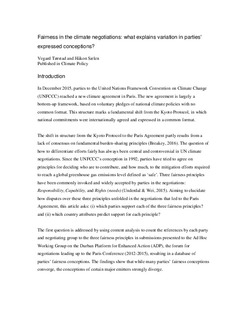Fairness in the climate negotiations: what explains variation in parties’ expressed conceptions?
Journal article, Peer reviewed
Accepted version
Date
2017Metadata
Show full item recordCollections
- Journal articles [478]
Original version
10.1080/14693062.2017.1341372Abstract
How to differentiate efforts and obligations fairly between countries has been among the most central and controversial issues in climate negotiations. This article analyses countries’ fairness conceptions as expressed in position documents submitted during negotiations leading to the Paris Agreement. A regression analysis investigates which country characteristics predict relative support for three fundamental fairness principles – Responsibility, Capability and Rights (needs). The most consistent and important explanatory variable turns out to be whether a country is included in Annex I to the United Nations Framework Convention on Climate Change (UNFCCC), which lists developed countries. This finding is compatible with the hypothesis that parties invoke fairness principles with the goal of advancing their own interests: non-Annex I parties wanted this particular scheme of differentiation to be upheld in the Paris Agreement, whereas Annex I parties advocated its removal. Notably, the outcome in Paris omits references to Annex I. However, the Agreement does contain multiple references to ‘developed’ versus ‘developing’ countries, hence introducing a more subtle and ambiguous differentiation than before. Post-Paris, seemingly technical discussions have encountered ‘roadblocks’ that partially derive from how the Agreement resolved the issue of differentiation between developed and developing countries. It therefore appears that negotiators will have to continue to deal with this issue, even though it may take on a new dynamic now that the Annex I division has less force. Looking for pragmatic solutions tailored to each substantive agenda point will be likely more fruitful than discussions at the level of fairness principles aiming for one overarching solution.
Description
This is an Accepted Manuscript of an article published by Taylor & Francis in Climate Policy on 31 Jul 2017, available online: http://www.tandfonline.com/doi/full/10.1080/14693062.2017.1341372
